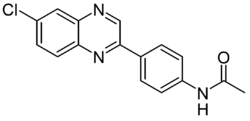Chemistry:CA77.1
 | |
| Identifiers | |
|---|---|
| |
| PubChem CID | |
| Chemical and physical data | |
| Formula | C16H12ClN3O |
| Molar mass | 297.74 g·mol−1 |
| 3D model (JSmol) | |
| |
| |
CA77.1 (CA) is a synthetic compound that activates chaperone-mediated autophagy (CMA) by increasing the expression of the lysosomal receptor for this pathway, LAMP2A, in lysosomes. CA77.1 is a derivative of earlier compound AR7(HY-101106), which shows potent CMA activation in vitro but is not suitable for in vivo use.[1][2][3] CA77.1 is able to activate CMA in vivo, and demonstrates brain penetrance and favorable pharmacokinetics. It has been shown in animal studies that in vivo administration of CA77.1 to enhance chaperone-mediated autophagy, may help to degrade toxic pathogenic protein products such as tau proteins and has potential applications in the treatment of Alzheimer's disease[4][5] particularly in improving both behavior and neuropathology in PS19 mice models.[6]
References
- ↑ "Chemical modulation of chaperone-mediated autophagy by retinoic acid derivatives". Nature Chemical Biology 9 (6): 374–82. June 2013. doi:10.1038/nchembio.1230. PMID 23584676.
- ↑ Cuervo AM, Gavathiotis E, Xin Q, Das BC, "Retinoic acid receptor antagonists as chaperone-mediated autophagy modulators and uses thereof", US patent 9512092, published 18 June 2015, assigned to Albert Einstein College of Medicine of Yeshiva
- ↑ Cuervo AM, Gavathiotis E, "Benzoxazole and related compounds useful as chaperone-mediated autophagy modulators", WO patent 2020077024, published 16 April 2020, assigned to Albert Einstein College of Medicine of Yeshiva
- ↑ "Chaperone-mediated autophagy prevents collapse of the neuronal metastable proteome". Cell 184 (10): 2696–2714.e25. April 2021. doi:10.1016/j.cell.2021.03.048. PMID 33891876.
- ↑ Cuervo AM, et al. Compounds Useful as Chaperone-Mediated Autophagy Modulators. Patent WO 2020/046335
- ↑ "Error: no
|title=specified when using {{Cite web}}". https://www.medchemexpress.com/ca77-1.html.
 |

